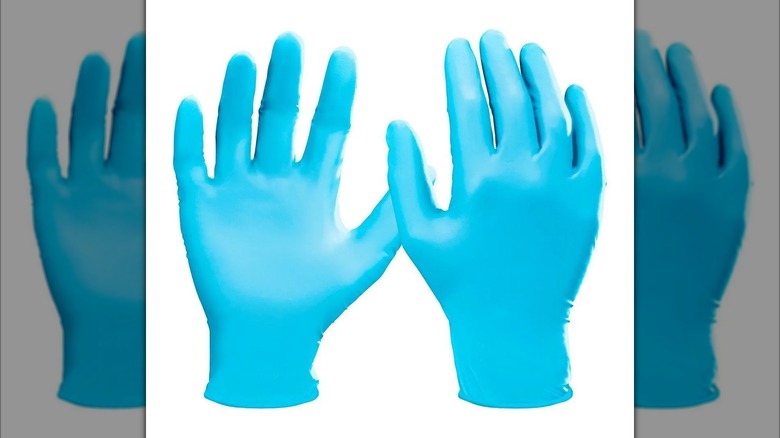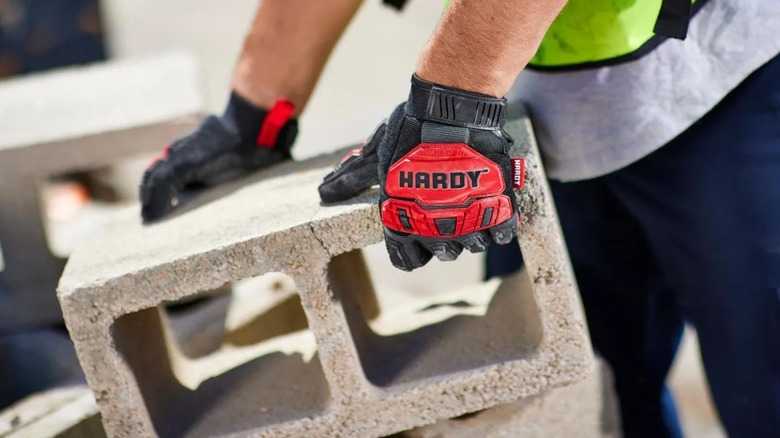Harbor Freight Gloves: How To Choose The Right Pair For The Job
The one thing you should never, ever forgo when working in manual labor or home D.I.Y. crafting is proper hand and digit protection. Your hands are your first and foremost means of interacting with the world and getting things done, and should be treated with all the care and caution they deserve. Of course, when lifting, crafting, and cutting, your hands are naturally closer to potential danger, which is why you should always have protective gloves ready for action.
However, there is no such thing as one-size-fits-all for gloves, both in the literal sense and for the kinds of jobs you can get up to. There are different types of gloves available from hardware stores like Harbor Freight for different kinds of work, whether it's handling sensitive chemicals, working with sharp, powerful tools, or getting into complex mechanical work. A particular type of glove may not provide adequate protection for whatever work you're doing, or even if it is the right type, its small details, like fit and materials, could end up getting in your way. It's on you to know what you're looking for before you run off to Harbor Freight and buy the first pair of gloves that catches your eye, so here are some key points to keep in mind.
Know the differences between disposable and work gloves
The vast majority of gloves sold at Harbor Freight come from its in-house Hardy brand, with a few exceptions from other brands like Vulcan, Badland, and Chicago Electric. The first and foremost distinction between Harbor Freight's gloves is that there are both disposable gloves and reusable work gloves. One type is meant to be disposed of after use, while the other can be used over and over. Harbor Freight has a selector tool to help you find your ideal pair, but here are the broad strokes.
Hardy disposable gloves come in large boxes, usually numbering around 50 to 100, and are meant to be peeled off and thrown away after you're done using them. The key to disposable gloves is the thickness of the material that they're made of, measured in mils; depending on what your disposable gloves are composed of, they're suitable for different degrees of potentially hazardous work. For example, if you're just cleaning or painting a wall, Hardy's 5 mil nitrile gloves will work fine. For heavy-duty work involving potentially corrosive chemicals, though, you'll want a box of Hardy's much thicker 9 mil gloves to ensure nothing reaches your bare skin.
On the other hand, if you're working less with chemicals and more with overtly hazardous implements and devices, that's a job for reusable work gloves. For instance, Hardy's deerskin leather work gloves are naturally resilient against cuts, punctures, and sudden impacts. There are also more job-specific gloves, like Hardy's chainsaw protection work gloves, which are built thick enough to stop a chainsaw blade. Whether it's for work or protection during an emergency, you'll be glad you had some reusable work gloves.
Double-check materials, fit, and extra features like textures and protection
Knowing the broad strokes between disposable and reusable gloves will definitely help to point you in the right direction when you visit Harbor Freight. When it's time to actually pick a pair, though, there are some additional minor factors you should be cognizant of.
Firstly, you should know what your glove size is and compare it to the sizes available. You want your gloves to fit firmly, yet comfortably, tight enough that they won't slip off or compromise your grip, but loose enough that you still maintain full articulation in your hands and wrists. There are usually sizing charts available near glove displays at Harbor Freight, but if you're not sure, ask a store associate if you can try one on.
Next, consider the precise materials a prospective pair of gloves is made of. Hardy's disposable gloves are made of materials like nitrile or vinyl, which some people can find irritating to their skin. If you have any allergies like that, make sure you check the box before you buy. The same goes for reusable gloves, which can be made of an even wider variety of materials. The material can also affect the gloves' overall resilience; Hardy's string knit gloves are light and warm, for instance, but a single layer of knit fabric won't offer as much protection as leather or a synthetic blend.
Finally, for reusable work gloves, check what kinds of extra features are included. Many of Harbor Freight's offerings have various perks, such as gloves with impact-resistant TPR plates, gloves with latex dips for improved grip, and gloves with extra insulation for cold and wet work. Think carefully about what kind of work you're doing, and Harbor Freight should be able to meet your needs.


